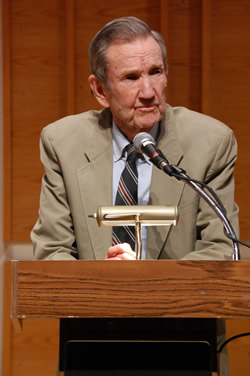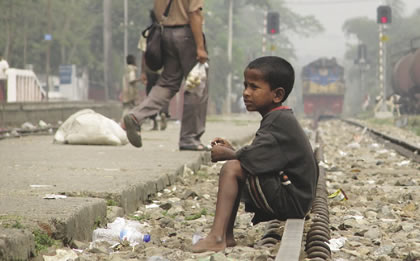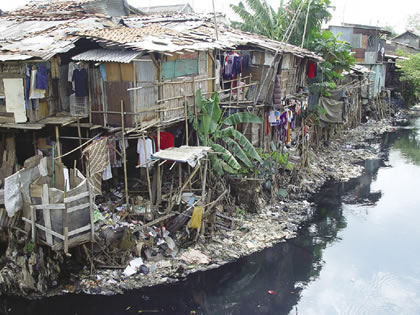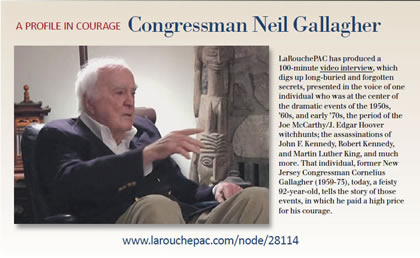SCHILLER INSTITUTE CONFERENCE
Building A World Land-Bridge:
Realizing Mankind's True Humanity
Thursday, April 7, 2016, 9:00am - 9:30pm
NEW YORK CITY
Panel I: The New Silk Road Becomes the World Land-Bridge
The Idea of Justice Is Still Alive
presented by Ramsey Clark

EIRNS/Stuart Lewis
Ramsey Clark: “We ought to look forward to the challenge with joy.” |
Program and video
Invitation
A PDF version of this article appears in the April 22, 2016 issue of Executive Intelligence Review and is re-published here with permission.Ramsey Clark, U.S. Attorney General 1967-1969, spoke at the Schiller Institute conference in New York, April 7.
Dennis Speed: There was a time in the United States when the citizens of this country appealed to their government for justice, and their government would respond. This was the time of the Roosevelt Administration of the 1940s and the time of the Kennedy Administration of 1961-63. Next May we will celebrate the 100th birthday of JFK. That was the last period, the 1960s, when the United States really was still a society striving toward justice, although it was a highly imperfect nation. Now this man, whose humility is undeserved, is one of the last expressions of that time of justice. Whether we are talking about his protection of Martin Luther King on the march from Selma to Montgomery, 51 years ago in Alabama, or his opposition to the Iraq wars of 1991 and 2003, his defense of controversial personages in his legal practice, or his speaking out in any case of injustice upon which his attention falls, he has distinguished himself by insisting on the truth. He still represents the idea of justice in the United States and, as with Socrates in Athens, as long as he is in the United States, and here in New York City in particular, the idea of justice is still alive in the United States. Please join me in welcoming to the podium former Attorney General of the United States Ramsey Clark.
Peace and the Elimination of Poverty
Ramsey Clark: Thank you, thank you. Well, what a good audience and gathering in the cause of peace, and the elimination of poverty, and the address to the last true remaining challenges to humanity, and living in peace together on mother Earth. We are not very good children. We mistreat our mother in more ways than we really understand.

GFDL/Mohammed Tanvirul Islam
Street child at Srimangal Railway Station, Bangladesh. |
Late last year I flew from north to south in Korea and from north to south in Viet Nam, and the devastation that was wreaked on those two countries in the last century is still so manifest. You look at areas where Agent Orange was mindlessly deployed, and you have what could only be called a vast wasteland, more than a wasteland; it is not healthy to be there, after all these years. The amount of money that we spent, the vastness of our national involvement in the projects, if you want to call it that, and the death and destruction, both physically and, not easily measured, but clearly morally as well, is undeterminable.
We have a vast challenge still in defining how, and living by, principles that will ensure peace. It will take us out of the laboratory where mad scientists are still trying to find better and more efficient means of mass destruction, to where we have a society that is more interested in the welfare of our children than the status of our national defense, which is a corruption of the word defense, because it really implies just the opposite, the power to coerce others by the threat or use of superior technology and mass destruction, and superior forces committed to its deployment.
The planet is still habitable in spite our strenuous efforts, but if we keep on, we may wake up one morning and find that mother Earth is sick, that we are the cause of the sickness, and that if we don’t love our mama, we’ll pay a heavy price.
The Happiest Challenge
The challenge of addressing what is a crisis, is really one of the happiest challenges that a population ever had. It ought to be a lot more fun than developing new technology for mass destruction, because it’s how not only to preserve, but to improve the natural condition of the planet, a beautiful planet which offers peace and prosperity for all, and yet, because of our lusts and our conduct, still faces the possibility of mass destruction.
It amazes me how science,— I always enjoyed science, because I thought it was our effort to better understand all aspects of the, not only global, but planetary and interplanetary environment in which we live; there’s a great adventure still possible on this planet, and more interesting, in a way, at least in terms of its unknown aspects now, and mastery of the universe beyond. The biggest challenge we have is as simple as how to live together with love and affection and constructive conduct within our family and among our neighbors and across our nation, and most importantly of all, with peace and constructive interaction with all of the other neighbors that share the planet that still remains preponderantly beautiful, but has growing wastelands because of our thoughtless and careless and dangerous abuse of what we call mother nature.
We have the capacity to solve all of our problems; we engage more in creating problems, however, with more of our resources and the greater part of our energies and sadly, even our aspirations, in how we dominate the globe by the threat and use of violence, which a loving people would have prevented and overcome long ago. But look at the size of the militaries, look at the continuing investment in the discovery and creation, sometimes, of the development and utilization—by threat and by actual deployment—of the means we now have of mass destruction. Military budgets abandoned and transformed into education and food production and housing and family protection in Asia, and Africa, and Latin America will transform the quality of life on the planet; and still we are spending billions on forms of violence and the threat of their use to cause others to act as we want them to, in ways that are not good for their children, or ours either.
Until we violate what seems to be our major commitment to a superior capacity for violence, until we recognize its threat to our present and future, to our children, until we eliminate means of mass destruction and the will to tolerate them—to accept them as a presence in our midst—then we live in danger of the chance of our own conduct ending, or vastly impairing, the capacity for future generations to live in peace, with prosperity. Which doesn’t take too much, it means just the right amount to overcome our lust for acquisition and to enjoy the things that are really beneficial, really important, assuring the health and the well-being and education of all children everywhere, all adults and senior folks, like me, everywhere, employing our wits, such as they be, and our energies, which are clearly sufficient, if properly employed, to assure for every child born on Earth health and education and the opportunity to fully develop all of their potential for individual contribution to their own well-being and the well-being of their families and the well-being of the rest of us.
A Challenge You Can Really Enjoy

CC BY 2.0/Jonathan McIntosh
Slums built on swamp land near a garbage dump in East Cipinang, Jakarta, Indonesia. |
Now that is a challenge you can really enjoy, a lot more than working in the laboratory for development of the technology for mass destruction, even if that technology seems to be beneficial, but in fact is destroying the environment that is necessary for the continuation of life on the planet. If human nature likes challenges, and I have to admit to great affection for challenges—they interest me more than anything else around—then we will accept these challenges and we can overcome the suffering, the vast suffering, that is seen in any travel through poverty in the United States itself, but also vast parts of Africa, and Asia, and Latin America. If our real time and energies and desires were directed toward the quality of life—which means the quality of life of the planet, as well as of the living creatures here, crawling around on it—we will not only not become the first species to destroy itself, and probably take most of the others with us: Maybe some other forms will come along that won’t have such a lust for belligerency.
We need to face why it is that we still have scientists spending billions on the search for better means of mass destruction, the manufacture of the technology that can consume us with its product of mass destruction, when we are way behind on how we raise healthy and happy children and unified families, not only where we live, which is, because of our affluence, not so much a challenge as it is in most parts of the world.
We have an interest, a human interest, an important interest that is essential to the future on the planet, of ensuring health for all the children of the planet, most of whom have no insurance, either the corporate kind or just the human availability kind. They have mother love, but where mother is hungry and sick herself, her capacities are limited. And yet, when you go around the world, you see a larger suffering than the size of those who are celebrating an excess of affluence.
It’s one of the most interesting challenges that humanity has ever had, one of the most difficult certainly, one of the greatest, simply because of the numbers in the game today, but if we really enlist for the duration,— in a commitment to improving the quality of life globally for all people, in eliminating not only militarism, but the threat of all forms of violence toward humanity, the most dangerous of which may be not militarism now, but the threat to the environment.
We have a beautiful planet. It was given to us free of charge, and it requires some tending, and yet what you could call, in our system, “the profit motive,” not only pays no attention to the well-being of mother Earth, but exploits her, because the bottom line doesn’t require you to invest in the preservation of the environment and the productivity of the soil and, above all, the knowledge, understanding, and commitment of the people to a life of freedom and peace on the planet.
I travel too much—a sane person wouldn’t do it—and I don’t travel to happy places very often. I may pass through the airport at Paris, but I’m on my way to Bangladesh, or someplace where the human condition is not acceptable, where mere safety itself is never secure, not to mention food, and health care, and education. We have a vast challenge.
It is hard to imagine, though, a greater source of joy that people of conscience could have, than putting your shoulder to the wheel to see that we are committed wisely—and with sufficient knowledge to know the consequences of our acts—to the preservation of life on the planet and the opportunity for all of the children yet to come, to enjoy a continually better condition than the condition in which we will leave it.
Mother Earth has deep scars from our conduct, and you can see them in cities and in the countryside of even the most prosperous nations. But you go to the continents where so many of the poor people live, to Africa and many parts of our own hemisphere, to parts of Asia, where vast millions and millions live without adequate health care, meaningful education, decent housing, or even decent food.
If you like challenge, then we live in the best of all times, because we have the greatest challenge and the clear potential to address and resolve all threats to the human condition on the planet. There is no need for children to die in infancy, or live in malnutrition and die young, and live with no peace and security—and yet it’s a constant threat to a major part of, if not most, of those of us who live currently in the third world, and even here, even in a great city like New York, there are children raised in conditions of poverty and neglect that are unacceptable to a humane concern.
Miles to Go Before We Sleep
Though the woods may be lovely, dark and deep, we have promises to keep, and miles to go before we sleep. But we need to recognize that we’re on the road, that we’re in a race between catastrophe and education—the deployment of what education tells us is essential for life, human life on the planet, in the century just ahead.
It won’t be an easy time. We’re pretty comfortable here, but if you look around, the real dangers are vast, and particularly in the environmental sector, we’re losing ground. They’re not recognized, and the people who endure the worst conditions are those with the least capacity to do anything about it, so it takes those with the greater capacity to come to the rescue of all of us, because on this small planet, with its huge population now, we are literally in the same boat, brother. As the old song went, when you shake one end, you’re going to rock the other.
 View full size |
So, those of us here who have had such a unique opportunity for knowledge, for a life of peace, for the opportunity to see what’s possible, we’ve got to pull our socks up and enjoy the most important struggle that humanity has faced, and that is how to live in peace, with a growing population.
We ought to look forward to the challenge with joy; we are lucky to have important work. All we have to do is recognize it, roll up our sleeves, and do it. This is the true joy of life; the joy, as Saul said, is in being deeply involved in a cause that you yourself deem mighty, being fairly worn out before you are thrown on the scrap heap. It is in seizing the opportunity to help our children, in a world that we have contributed to, to overcome the many challenges to live in a future of peace and plenty, where love permeates all the societies within themselves and among each other.
